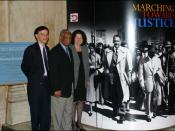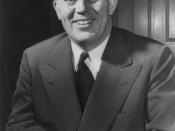Chief Justice Earl Warren defied the american society of the times to help make the future of the country a little brighter. His decisions were controversial to say the least, but his legacy lives on as one of the most influential of the Supreme Court in all US history. When asked what his most important ruling was, many thought the response would be Brown v. the Board of Education. And although this decision did many positive things for the civil rights movement, his response was that of Reynolds v. Sims.
The 1964 case surrounded the issue of reapportionment of state and federal legislative districts. The decision of "one person-one vote," gave the citizens a voice. The number of representatives is determined by the number of people, not by the size of the land they live on. Here, Warren cited the fourteenth amendment to the Constitution to support his opinoin.
Another Warren decision having to do with the fourteenth amendment is that of Miranda v.
Arizona. From this case the "Miranda warning" was created which is now known as the "Miranda rights." When arresting a suspect a number of his rights must be stated to him before being taken into custody. Specific to this case was the right to remain silent before speaking to a lawyer.
Warren dealt with the first amendment when tackling the heated debate of religion in schools in Engel v. Vitale. In his decision he again clung to his strict constructionist ways. He ruled that prayer in the New York State Regent schools was illegal. It was in direct violation of the "wall of seperation" between church and state established in the Constitution.


